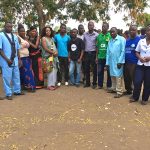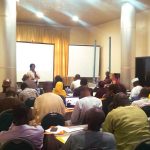Date
04/2017 – 03/2020
Country
Rwanda
Client
EU
Financing Institution
EU
Consortium Partner
Every1Mobile Ltd., DUHAMIC-ADRI
m4h Key Areas
Health Services, Health Information
Project Description
The European Union supports Rwanda’s National Multi-sectoral Strategy to Eliminate Malnutrition by actively reducing the number of people living below the minimum level of dietary energy consumption and improving the nutrition of mothers and children through innovative and cost-effective behaviour change approaches.
management4health, together with its partners Every1Mobile (UK) and DUHAMIC-ADRI (Rwanda) have been contracted to provide Technical Assistance to the Rwanda Biomedical Centre (RBC), which is the operating arm of the Ministry of Health.
m4health provides technical leadership in design of appropriate social behaviour change communication (SBCC), programming, research, and capacity-building, and Nutrition knowledge management. The m4h led consortium also support RBC and the recently established National Food and Nutrition Coordination Secretariat (NFNCS) to enhance existing tools and create new tools as deemed reasonable. Channels that will be used include most prominently radio and print media, but also TV, so called “outdoor” and community channels such as street theatres. Digital channels such as Social Media and an interactive website will also be supplied.
m4h and partners are currently working to define quality criteria for improved service delivery, creating assessment tools for providers and management tools and demand generation campaigns for clients and communities. Core elements of m4h’s work include capacity building, research and evaluation, and knowledge sharing. Training are planned for all cadres working in the field of improved nutrition through a “Master Trainer” approach so that all health workers and volunteers providing educational messages to the population will be better equipped for this task.
Scope of work
Inventory of BCC tools and assessment:
- Assess the identified BCC and communication tools and practices in Rwanda aiming at improved nutrition outcomes in all sectors (agriculture, health, social protection, gender).
- Investigate drivers and barriers to food consumption and identify gaps in food consumption.
- Identify key entry points and develop messages on nutrition and plan accordingly the development of BCC tools.
BCC Tool creation:
- Design, test, produce and disseminate innovative print-based tools to enhance BCC for improved nutrition.
- Design and test innovative/improved existing tools to enhance BCC for improved nutrition such as radio spots, television spots, community approaches, mass media, social media, use of champions.
- Test different entry points and delivery channels.
- Incorporate community level fora and their channels of communications to enhance BCC for improved nutrition.
- Measure the effectiveness and cost efficiency of the different solutions offered.
Training of all partners involved in nutrition:
- Identify all main stakeholders directly involved in nutrition communication at local level and key entry points for training.
- Design and perform training for all the main partners working at district level for fighting malnutrition under the coordination of the government to be able to mainstream BCC in their programme with local workers.
- Measure the results of trainings.
Mainstream the use of the tools and approaches into the government’s annual planning:
- A final plan for the development and upscale of BCC on nutrition in Rwanda is adopted.
- Costed modules for the tools and approaches aligned to the formats required by Rwanda’s annual planning and budgeting processes are developed.
- Nutrition Secretariat Staff and staff from line ministries are trained on the latest BCC for nutrition communication techniques.



